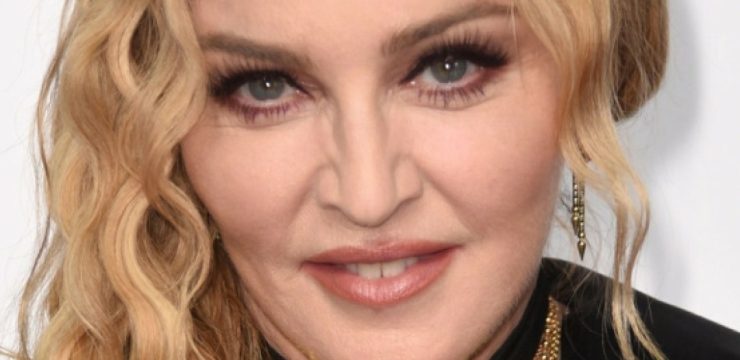Kirk Douglas, a monumental figure in the history of American cinema, was a man who not only defined Hollywood’s Golden Age but also left a lasting legacy that transcended the silver screen. His name became synonymous with intensity, integrity, and resilience. Born as Issur Danielovitch on December 9, 1916, in Amsterdam, New York, Douglas emerged from humble beginnings that shaped both his character and career. His parents were Russian-Jewish immigrants who had settled in the United States in search of a better life. His early years were marked by economic hardship, struggle, and a constant battle for identity and stability in a world that didn’t make things easy for a poor immigrant family. Yet, even in the face of these challenges, Douglas showed signs of a remarkable inner strength and an unyielding drive to succeed.
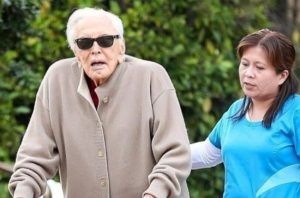
From a young age, Douglas knew he wanted more than what life had dealt him. He worked dozens of odd jobs—ranging from a janitor to a dishwasher—just to support himself and eventually fund his education. He put himself through St. Lawrence University and later trained as an actor at the American Academy of Dramatic Arts in New York City, where he would meet lifelong friend and fellow actor Lauren Bacall. These early experiences, filled with grit and perseverance, laid the foundation for the steely persona that audiences would come to know on screen. Douglas didn’t just act—he embodied his roles with such force and authenticity that it was impossible to ignore him.
His breakthrough came in 1949 with the film “Champion,” where he played Midge Kelly, a ruthless and ambitious boxer. The performance was nothing short of electrifying, earning him his first Academy Award nomination. What made Douglas stand out wasn’t just his chiseled features or magnetic screen presence—it was the way he poured raw emotion into every frame. He had the uncanny ability to play deeply flawed characters while still compelling the audience to understand, if not sympathize with them. This role set the tone for his career: a mix of vulnerability, defiance, and undeniable power.
Douglas followed this success with a string of critically acclaimed roles that further established him as one of Hollywood’s most versatile and committed actors. In “The Bad and the Beautiful” (1952), he portrayed a manipulative movie producer, delivering a performance that showcased his range and nuance. Then came “Lust for Life” (1956), where he took on the monumental task of portraying the tortured genius Vincent van Gogh. For this role, Douglas immersed himself in the Dutch artist’s tormented psyche, portraying his madness and passion with such intensity that it earned him another Academy Award nomination and solidified his status as a serious, transformative actor.
In 1957, he starred in Stanley Kubrick’s war drama “Paths of Glory,” a film that would become one of the most powerful anti-war statements in cinematic history. In the role of Colonel Dax, Douglas played a principled officer caught in a corrupt military system, once again channeling his personal convictions into the character. The film was a bold critique of military injustice and bureaucratic cruelty, and Douglas’s willingness to take on such controversial material reflected his deep commitment to art that challenges and provokes. He wasn’t just acting—he was using his platform to question the status quo and advocate for truth.
But Kirk Douglas wasn’t content to merely be a star. He wanted to change the way movies were made. In an era when most actors were under studio contracts and had limited creative control, Douglas pushed boundaries. He established his own production company, Bryna Productions, named after his mother. Through this venture, he not only gained greater authority over the projects he worked on but also championed stories and filmmakers who might not have had a voice otherwise. His most famous project as a producer was the 1960 epic “Spartacus,” directed by Stanley Kubrick.
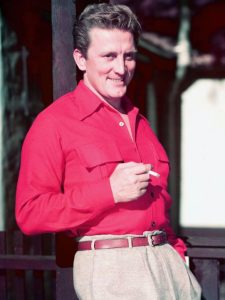
“Spartacus” was more than a box office success; it was a watershed moment in Hollywood history. The film openly credited blacklisted screenwriter Dalton Trumbo, who had been barred from working in the industry due to the McCarthy-era witch hunts. By defying the blacklist and hiring Trumbo under his real name, Douglas played a pivotal role in ending one of Hollywood’s darkest chapters. It was a move that required courage and conviction, and it forever altered the course of film history. Douglas proved that integrity could triumph over fear, and in doing so, he became a symbol of artistic freedom and moral backbone in an industry often driven by profit and conformity.
His career spanned more than six decades, during which he appeared in over 90 films. Douglas worked across genres—from noir to westerns, historical dramas to psychological thrillers—and collaborated with some of the greatest directors of his time. He was a perfectionist who demanded the best from himself and those around him, but he was also deeply introspective. He understood the cost of fame and the toll that a life lived in the spotlight could take. Despite his success, Douglas remained grounded in his roots and was constantly driven by a desire to give back.
Outside of acting, Douglas was a prolific writer. He penned several memoirs and novels, offering candid insights into his life, career, and personal struggles. In 1996, he suffered a severe stroke that impaired his speech and mobility. Many thought this would be the end of his public life. But in true Kirk Douglas fashion, he defied expectations once again. Through grueling therapy and unwavering determination, he learned to speak again and returned to public life with the same fire and passion that had defined his early years. He even wrote about the experience in his memoir “My Stroke of Luck,” offering hope and inspiration to stroke survivors around the world.
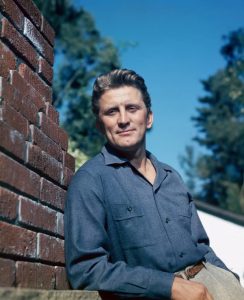
Douglas was also a dedicated philanthropist. Alongside his wife, Anne, he donated millions of dollars to charitable causes, including education, healthcare, and the arts. They funded scholarships, built playgrounds, and supported underprivileged communities. He believed in using his wealth and fame to make a difference, and he remained committed to that mission until the end of his life. His generosity and compassion were as legendary as his performances, and they added another layer to his already rich and complex legacy.
Perhaps what made Kirk Douglas truly unforgettable was his unwavering sense of self. He never lost sight of who he was or where he came from. Even at the height of his fame, he remained Issur Danielovitch at heart—a boy from Amsterdam, New York, who dreamed of something more and fought with everything he had to achieve it. His journey from poverty to stardom wasn’t just a personal triumph—it was the quintessential American story. He embodied the spirit of determination, resilience, and the belief that with enough hard work, anything is possible.
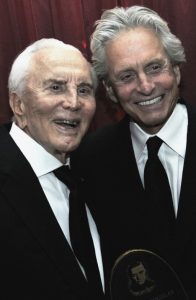
His legacy continues through his family, especially his son Michael Douglas, who became a celebrated actor in his own right. But Kirk Douglas’s influence goes far beyond his bloodline. He changed the way we think about acting, storytelling, and what it means to stand up for what’s right. He proved that an actor could also be a leader, an activist, and a force for good. His life was a testament to the power of perseverance, courage, and the enduring human spirit.
Kirk Douglas passed away on February 5, 2020, at the age of 103. But he didn’t just leave behind a collection of films—he left behind a blueprint for what it means to live a life of purpose. He taught generations of performers how to take risks, how to own their craft, and how to use their voice to fight for something bigger than themselves. Every time a new actor dares to take on a controversial role, every time a filmmaker chooses truth over comfort, and every time someone from humble beginnings dreams of greatness, Kirk Douglas’s spirit lives on.
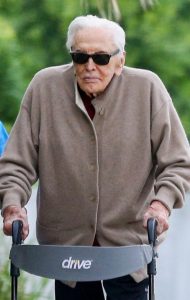
In an industry often obsessed with the new and the now, Kirk Douglas stands as a timeless reminder of what it truly means to be a legend. Not because he sought fame, but because he earned it. Not because he followed the rules, but because he had the courage to break them. His name may be etched in Hollywood’s history books, but more importantly, his story is etched in the hearts of those who still believe in the power of cinema to move, challenge, and inspire. Kirk Douglas was more than a star—he was a force of nature. And his light, even in his absence, continues to shine just as brightly.



